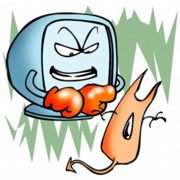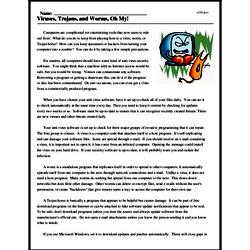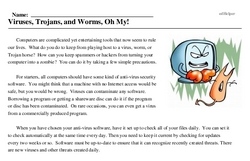Viruses, Trojans, and Worms, Oh My!
November
Reading Comprehension for November 30
Computers are complicated yet entertaining tools that now seem to rule our lives. What do you do to keep from playing host to a virus, worm, or Trojan horse? How can you keep spammers or hackers from turning your computer into a zombie? You can do it by taking a few simple precautions.
For starters, all computers should have some kind of anti-virus security software. You might think that a machine with no Internet access would be safe, but you would be wrong. Viruses can contaminate any software. Borrowing a program or getting a shareware disc can do it if the program or disc has been contaminated. On rare occasions, you can even get a virus from a commercially produced program.
When you have chosen your anti-virus software, have it set up to check all of your files daily. You can set it to check automatically at the same time every day. Then you need to keep it current by checking for updates every two weeks or so. Software must be up-to-date to ensure that it can recognize recently created threats. There are new viruses and other threats created daily.
Your anti-virus software is set up to check for three major groups of invasive programming that it can repair. The first group is viruses. A virus is a computer code that attaches itself to a host program. It's self-replicating and can damage your software files. Some are spread through e-mail. If you should receive an e-mail containing a virus, it is important not to open it; it has come from an infected computer. Opening the message could install the virus on your hard drive. If your security software is up-to-date, it will probably warn you and isolate the infection.




